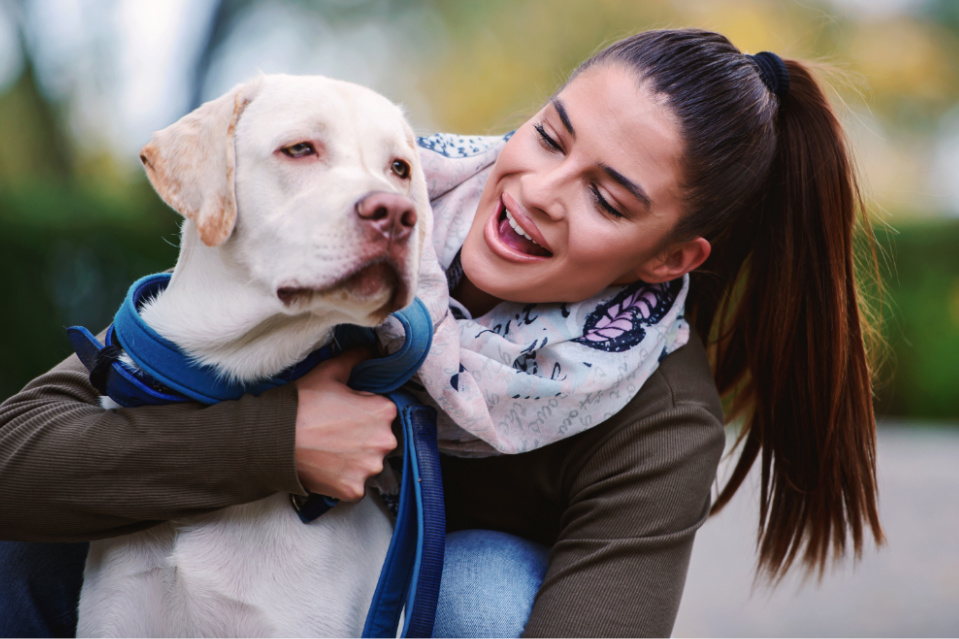Labradors are known for their incredibly friendly and amicable nature, among others. However, they are not automatically the well-trained and behaved dogs that they are known to be. Initially, you need to learn on teaching your labrador good manners to ensure that they become well-adjusted regardless of any situation they’re in.
Dogs are not born with the proper social cues on how to act and play around in the human world. Instead, they have canine instincts that they are likely to act on unless they are trained. Teaching your Labrador good manners is a matter of great importance, especially when your Lab is around people a lot.
This isn’t always easy, however. Each Labrador responds differently to training, and some may be more difficult to train for good manners than others.
You cannot expect that every training guide will work for your little Labrador retriever the same way it did for others. After all, according to research, canine personality can vary from one dog to another.
Even so, there are general tips and guidelines that we can go over to help you in teaching your Labrador retriever to have good manners. You may find them below.
What is an obedient or a good-mannered Labrador retriever?
Generally, a well-behaved Lab is one that knows how to follow cues and act appropriately among people.
The first thing to understand as a pet owner is that the behaviors we attach to our Labs as good or bad are our own conceptions of how they should act. No matter what we think, dogs are dogs and will act like dogs, unless trained otherwise.
This means that they will not understand that jumping excitedly on strangers or running around visitors in the house are bad things. They are simply acting like themselves.
However, if you have trained your Lab to have good behavior, they will know how to act in situations like these. When you walk them, they will act appropriately and listen to any cues you may give them. They will also learn to hold cues or commands like sit, even when you have already left the room. An obedient Lab will come when called by its owner.
Another essential thing to consider when it comes to training your Lab to be obedient is that it’s not for the owner to exercise complete control. It’s for the mutual protection and benefit of the owner and the dog.
A well-mannered Lab that comes when called is less likely to get lost or get hurt than those who don’t. Having a good-mannered Lab will also help you create a more sensible routine, and you won’t feel overburdened by the task of taking care of your pup. Training is meant for a great dog-owner relationship and will allow you and your pet to thrive together.
Considering all that, we have listed down 9 tips on how to teach good manners to your Labrador.
How to Teach Basic Manners to Your Labrador
1. Do not beat or hurt your Labrador while training them to have good behavior.

Before anything else, every pet owner should understand that beating their dogs will be counterintuitive in training them. Hurting them will not teach them good manners. Instead, it will teach them fear.
There are numerous ways you can instill good behavior in your pet without resorting to pain. Rewarding good behavior is one good example of this.
2. Positive reinforcement is a good way of teaching your Lab to become good-mannered.
Instead of reprimanding your dog all the time for bad behavior, you could try rewarding them for good ones. Give them a reward whenever they accomplish specific tasks or listen to you obediently.
Go slow on the treats, though, since Labradors are prone to obesity. If possible, try to consider other reward options.
3. Train your Lab for good manners while they are young.
It’s not that adult Labradors cannot be trained—because they can. However, it’s much easier to learn how to train your puppy to have good manners since they have not yet developed the habits that you would have to undo in an adult Lab. Training them early can also make your relationship with your pet much smoother down the road.
4. Be short and concise with your Labrador training.
Your Labrador retriever will not understand you well when you talk to them in long and complicated commands. There’s a reason why common cues are one-word statements like “sit” or “stay”. Your dog will process these cues much easier than they would longer ones.
Something that you must also consider is saying your command only once and avoiding repeating yourself. Dogs could misinterpret this and will only do the command if you’ve repeated it enough times.
5. Read and educate yourself on how to train your Labrador to have good manners.
A common mistake that pet owners make in teaching their Labs good behavior is not being adequately informed about the topic.
Read online or handbooks that you can get your hands on. Training your dog will not be an easy task, especially when you are still inexperienced. Reading up on the topic and staying informed about the latest and most effective dog training exercises will help you on your journey.
6. Consult a professional trainer who is well-versed in training for pets.
This is a great option, even if you are training your Lab at home. If you have the extra funds to put into professional training, go ahead! Just make sure that what you are reinforcing at home is the same thing or in line with how your professional trainer approaches Labrador training so that your pet will not be confused.
7. Be consistent about teaching good manners to your Lab.
Contrary to some people’s belief, training is not a one-time job. Instead, training takes time and dedication to really integrate good habits into your Lab.
Don’t be discouraged if you are not going at a breakneck pace because every dog responds differently to training. What you can do instead is to reinforce the training all the time to make sure that what you are teaching your dog really sticks.
8. Exposure is key to teaching good manners to your Labrador.
Exposing your Lab to as many situations as possible will help them manage their behavior and act appropriately in social situations.
If they are in an unfamiliar setting, your pet might not understand that they have to act a certain way. Letting your Labrador retriever experience varied situations will help them learn how to behave well no matter the situation.
9. Your Lab is your friend.
Treat your Labrador-in-training with kindness, and it will yield great results. After all, the purpose of training your dog is to guide them to live a happy domestic life, not to take full control of their actions.
Train your Labrador with empathy and try to understand how they learn. Tuning in to their likes and dislikes will help you customize their training in a way that they will be able to learn effectively.
All in All
The suggestions above are just a few of the basic tips that you can apply in your daily training with your Labrador. So, whether you take a lot of time in training or train in short bursts throughout the day, we suggest that you keep all of them in mind.
Over time, you will learn what’s best for your Labrador, and you will find the most effective method of training for them. Until then, be considerate in training your Lab pup. They were not born understanding human etiquette or laws, and you shouldn’t expect them to pick up things immediately.
Training is key to creating a great bond with your dog, and you should always try to do it the right way. If you need further advice, you may also check out our post here.






